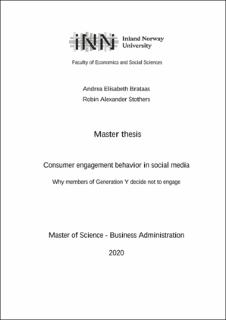| dc.contributor.author | Brataas, Andrea Elisabeth | |
| dc.contributor.author | Stothers, Robin Alexander | |
| dc.date.accessioned | 2021-08-16T08:28:44Z | |
| dc.date.available | 2021-08-16T08:28:44Z | |
| dc.date.issued | 2020 | |
| dc.identifier.uri | https://hdl.handle.net/11250/2767905 | |
| dc.description | Spesialisering markedsføringsledelse | en_US |
| dc.description.abstract | Abstract
Purpose - This thesis aims to develop understanding of why certain consumers choose not to engage in social media. Earlier research on the topic is highly based on positive and negative consumer engagement, which leads to opportunities for studying why some members of Generation Y decide to stay neutral. Design, methodology and approach - the data collection process is based on semi-structured interviews with ten respondents, showing different levels of engagement and a variety in behavior on social media platforms. Findings - The empirical findings reveal how personal branding, social phobia and self-focus affects how and to what extent members of Gen Y choose to engage on social media platforms. Research limitations and implications - This study is related to mapping levels of user engagement and types of behavior on social media. We chose to focus on the overall engagement and behavior, with the main focus on social media users, within Generation Y. The main research limitation is that our study only covers a small part of social media users in Norway, which limits the research setting. Practical and theoretical implications - In theory, this study reveals how different elements affect decisions towards consumer engagement on social media platforms. It describes what goes through members of Generation Y’s minds before deciding whether or not to engage with content from commercial brands. Practical implications are presented to aid brands in properly motivating CEB. Originality / values - This master thesis provides a deeper understanding regarding why certain users on social media platforms choose not to engage with brands and other users. The study is limited to social media behavior of users in Norway. Our findings, however, may have value in other contexts around the world as members of Generation Y share some similar traits, where the understanding of users’ behavior on social media platforms may be used in other scenarios. | en_US |
| dc.language.iso | eng | en_US |
| dc.subject | Qualitative Method | en_US |
| dc.subject | kvalitativ metode | en_US |
| dc.subject | Generation Y | en_US |
| dc.subject | Commercial Brand | en_US |
| dc.subject | Social Media | en_US |
| dc.subject | sosiale medier | en_US |
| dc.title | Consumer engagement behavior in social media Why members of Generation Y decide not to engage | en_US |
| dc.type | Master thesis | en_US |
| dc.subject.nsi | VDP::Samfunnsvitenskap: 200::Statsvitenskap og organisasjonsteori: 240: | en_US |
| dc.subject.nsi | markedsføringsledelse | en_US |
| dc.source.pagenumber | 92 | en_US |
